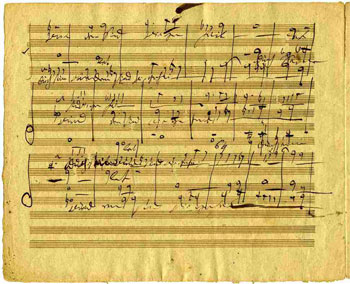| 23 December 2007 |
Perspiration and Inspiration Here’s the way art works: You dedicate yourself to a course of training. Day after day, you hone your craft, creating workmanlike, pedestrian products, to which you devote yourself nonetheless, just as if they were the pinnacle of inspired creativity. Thus you refine your skills. Knowledge becomes familiarity, the familiar becomes unconscious, the unconscious becomes reflex, until the fine points of your craftsmanship are effortless and utterly unthinking. Then, one day you are enlisted by God. You are in a trance. Your mind, your body, your hard-earned skills become entrained in a creative process quite apart from your own will. Later, you will read this poem, or listen to this music, or view this canvas, awestruck with wonder, having no knowledge from whence it came, nor any memory of its creation. — Josh Mitteldorf |
| 22 December 2007 |
Singing to Deer “At solstice, the woods were bright in a snowy way, the sky pearl gray above the stately maples and gnarled burr oaks...I especially like to walk among the sleeping trees in the half-lit silence of winter dawns... “Desire burst in my heart: to speak to the deer, to tell them how beautiful they were, to thank them for bringing wildness to the edge of the vast city. To speak from my heart, my own little wild heart, to theirs. To celebrate the season with them...But I stood silent, for I do not speak the language of deer...” |
| 21 December 2007 |
Trouble, consciously chosen “Men must be capable of imagining and executing and insisting on social change if they are to reform or even maintain civilization, and capable too of furnishing the rebellion which is sometimes necessary if society is not to perish of immobility.” Genteel revolutionary, scholar and suffragette, Rebecca West was born this day in 1892. “It is always one’s virtues and not one’s vices that precipitate one’s disaster” |
| 20 December 2007 |
Knowledge within Truth is within ourselves. It takes no rise |
| 19 December 2007 |
Knowledge within Imagining is like feeling around You are the truth from The Soul of Rumi, a new collection of ecstatic poems translated by Coleman Barks |
| 18 December 2007 |
Why the world yields to understanding “The most incomprehensible thing about the universe is that it is
comprehensible.” Why are there any physical laws at all? Why not chaos and random, unpredictable behaviors for every physical object? Why are so many copies of a small number of fundamental particles (like electrons and quarks) when every particle might have been a unique individual? Einstein hoped it would be found that the universe was unique: that things had to be as they are for some deep and very general reason. Nowadays, most physicists think there is no such necessity. The best-developed, viable ideas of modern science about why things are the way they are come from the presence of human observers in the universe: If the universe were not the way it is, then there would be no beings here to study it. Certainly the existence of order is a precondition for any kind of patterns we might recognize as life, let alone intelligent life, so it is the most basic application of this Anthropic Principle. Still, many physicists are uneasy with the Anthropic Principle. It implies that there ‘are’ many other universes, in some sense of the word, even though these universes will never be observed by anyone, let alone by any human. Can science afford to carry such baggage? Many cosmologists have come up with schemes that connect these multiple universes. Perhaps black holes or quantum processes give birth to universes, each of which has somewhat different properties. Max Tegmark has put out the idea that mathematical objects themselves are alive, and that the world, including us, is (merely) mathematics. Ancient religious mystics proposed that thought is more fundamental than matter, and that matter is created in order to instantiate thought. For logical positivists of the last century, that idea seemed like a preposterous superstition, but modern physics has led us back in that direction.
Article in today’s Science Times |
| 17 Decembr 2007 |
Individual experimentation — personalized medicine Western medicine made its reputation based on two treatments: antibiotics and surgery. Antibiotics work because the bacteria that infect you are likely to be closely related to the bacteria that infect me. Surgery can be performed reproducibly to the extent that your anatomy and mine are similar. But many of the afflictions with which Western medicine still struggles are individual by nature. Cancer, immune disorders, diseases of the digestive system, and psychological ailments are the best examples. These are catalogued and described in the medical literature based on presenting symptoms, even when the underlying causes may be substantially different. A cure that has worked for me might be ineffective for you. Personalized diagnosis and treatment may be on its way in a few years, heralded by cheap, automated DNA sequencing. But for those of us who can’t wait, we can take power over our own bodies with a guided course of experimentation.
Ben Williams has written an inspiring account of his experience with brain cancer, designing a personal experimental protocol, and discovering a cure that worked for him. Long essay online. His book. |






